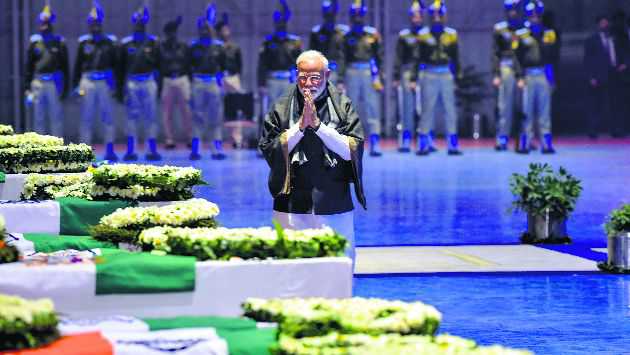
Tightrope: It will be tough for PM Narendra Modi not to be tempted into pursuing the diplomatic path.
Nilanjan Mukhopadhyay
Senior political analyst
THREE parallel tracks, of equal significance in both short and long terms, are running concurrently following the terror strike in Pulwama. Prime Minister Narendra Modi and his image of a ‘decisive leader’ or strongman, anchors each of these narratives, two of which were kick-started by the attack, while the third, limited to domestic politics, is becoming more melodramatic with the approaching elections.
The first and most important storyline was triggered by Modi’s hasty promise that the government would better Newton’s Third Law of Motion — the reaction would not just be equal and opposite but greater, whose quantum, timing and nature would be determined by the armed forms. Driven by his machismo and political necessity, Modi needlessly declared his retributive intention. Now, when the security and diplomatic establishments map their moves while assessing gains on the ambassadorial arena, there is a risk of anticipation raised by Modi transforming into impatience and negatively impacting the other plots.
The triggering of the second narrative was symptomatic of frustration at the inability to thwart Pakistan’s designs and quell terrorism despite a majority government and an authoritative leader. This stems considerably from portraying the ‘surgical strikes’ — the reality as well as the cinematic version — as an end in itself, whereas it should have been showcased as another ‘success’ in a protracted war. Now, because the actual ‘enemy’ cannot be targeted instantly, soft proxies are chosen. It is sad that the Supreme Court had to prompt 11 states, including those ruled by opposition parties, and the Centre to issue advisories to prevent violence and socio-economic boycott against Kashmiris. Undeniably, this attack was mounted by people who are ideologically positioned on the Right and their targets are not just the Muslims from Kashmir but other minorities, too, besides the usual suspects — academics, human rights activists (urban Maoists) and journalists.
These two narratives are already beginning to unambiguously impact the third storyline, of utmost importance to politicians of all hues — from chest-thumping ones to those who mock peers flaunting their bravado. Historians of the future will look for differing political assessment of voters in pre- and post-Pulwama phases. However, a few symptoms of the anti-incumbency sentiments being reversed are becoming visible. Over the past few days, candlelight marches were taken out by both restrained social groups and motormouths, fund collection is underway in middle-class colonies (few really know for what) and the social discourse is turning belligerent towards desh ke gaddar (traitors).
These are early days, but these programmes provide a sense of participation and bolster the spirit of vengeful nationalism. Modi once told this writer that as a 12-year-old, he joined people donating clothes to soldiers heading to the border posts. “These would have been of no use to them, but we felt that humne bhee ladayee me hissa liya (we, too, played a part in the war),” he said. In a couple of months, when these people now turning out queue up to vote, and when the discourse solely constitutes of polar opinions, it is anyone’s guess if they will cast their lot with ‘those for the nation’ or ‘those against it’.
But for this to politically benefit Modi, it is imperative to ‘do something’. To escape being consumed by the craving for an instantaneous response, shaped chiefly by his criticism of the UPA government after the 26/11 attacks and followed thereafter in 2013-14, Modi would have to ensure that the military response to Pulwama is visible as well as successful. India’s limitation is that the terror strike was just a noticeable episode of an asymmetric war waged against it for almost three decades. But, having done precious little in building capabilities to wage covert warfare against those targeting India, the rush to take visible action may compromise success and backfire politically.
The Indian State has worrisomely, consistently refused to delineate its enemies and instead, after every terrorist offensive, casts Pakistan in its entirety on the other side. Domestically, this provides an opportunity to the Indian Right to club critics of the official policy with the enemy. But this raises the ambition of the people and sets up a divergence with military objectives. Political leaders in the government can ill-afford prodding people to be driven by the ‘off with their heads’ sentiment.
After the 26/11 terrorist strikes, there was a sense of outrage in India, but this anguish was not stoked by the then government or the ruling party. The BJP, even Modi, who was then the Gujarat Chief Minister, criticised the Prime Minister for his gentleness. Yet, a few months after this, the Congress returned to power and the BJP ended up with a tally which was even lower than what it had won in 1991. The Congress became the first party after 1996 to cross the 200-mark in the Lok Sabha. The Mumbai terror attacks did not become a poll issue because the Congress had made no promises.
Modi will not have a similar cushion because he has raised the bar of desirability, insofar as what action should be taken, not only against terrorist groups, but also against Pakistan. Already, his decision to break protocol and hug Saudi Arabia’s Crown Prince Mohammed bin Salman caused dismay among a section of his supporters. The worry is that having allowed the imagination of the people to soar, the action being anticipated by them may not either be achievable or have major security and diplomatic ramifications. It will be tough for Modi not to be tempted into pursuing the diplomatic path, given the success at the United Nations Security Council. But this may force a delay in military action. Inversely, exhorting the security establishment runs the risk of forfeiting diplomatic gains. How Modi balances various pursuits will greatly impact his political fortunes.



























